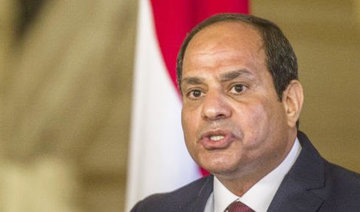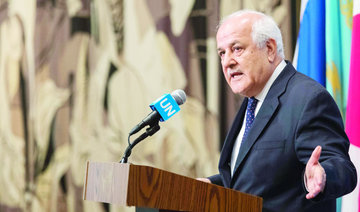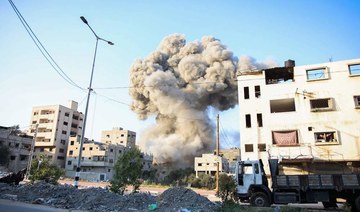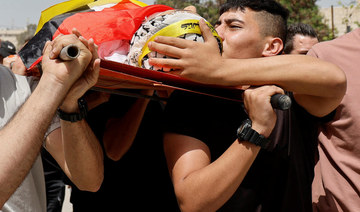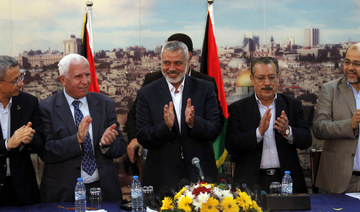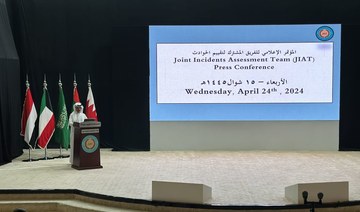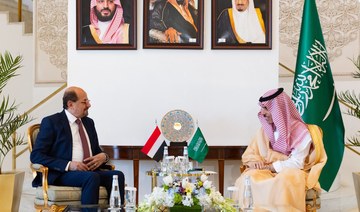JERUSALEM: Muslim leaders urged the faithful on Tuesday to keep up their prayer protests and avoid entering Al-Aqsa Mosque in occupied Jerusalem, even after Israel dismantled metal detectors that initially triggered the tensions.
Israel said it would replace the metal detectors with new security arrangements based on “advanced technology,” reportedly including sophisticated cameras, but said it could take up to six months to install them.
Muslim religious leaders have demanded that Israel restore the situation at the site to what it was before it installed the metal detectors last week.
The religious leaders said Tuesday that they need time to study the proposed new Israeli measures.
“We need to know all the details before we decide to pray inside the compound,” said Mufti Mohammed Hussein.
Muslim worshippers heeded the call of the religious leaders, with dozens performing noon prayers in the streets outside the holy site on Tuesday.
The continued protests meant that the escalating crisis between Israel and the Muslim world, which began in mid-July, has not been defused, even after Israel backed down on the metal detectors.
Jordan has played a key role in trying to end the showdown over the holy site.
Over the weekend, Jordan’s efforts were complicated by a shooting at Israel’s Embassy in Amman in which an Israeli guard killed two Jordanians after being attacked by one with a screwdriver.
A 24-hour standoff was resolve after a phone call between Jordan’s King Abdallah and Israeli Prime Minister Benjamin Netanyahu.
Jordan initially said the guard could not leave without an investigation, but then allowed him and the rest of the embassy staff to leave to Israel late Monday.
The timing of the events — the evacuation of the diplomats, followed by the removal of the metal detectors — suggested a larger deal had been struck between the two countries.
The 15-hectare holy site in Jerusalem’s Old City sits on the fault line of the Israeli-Palestinian conflict and has triggered major confrontations in the past.
Israel had erected metal detectors at the gates to the Muslim-administered site last week after gunmen killed two Israeli police guards there two days earlier.
The move incensed the Muslim world, amid allegations that Israel was trying to expand control over the site under the guise of security.
The installation of the metal detectors set off widespread protests and deadly Israeli-Palestinian violence over the past week. Large crowds of Muslim worshippers prayed outside the shrine in protest every day, refusing to pass through the metal detectors.
Israel has denied it has a hidden agenda, portraying the metal detectors as a needed security measure.
However, the Israeli government has come under growing diplomatic pressure in recent days to reconsider the decision. It also faced growing domestic criticism that it had acted hastily, without weighing the repercussions of installing new devices at the volatile site.
The diplomatic crisis with Jordan lent more urgency to finding a solution. The deal also coincided with a visit to Israel and Jordan by Jason Greenblatt, President Donald Trump’s Mideast envoy.
His visit marked the first on-the-ground involvement by the US administration since the start of the crisis over the shrine.
Israel’s security Cabinet announced the decision to remove the metal detectors early Tuesday. It said police would increase the deployment of forces until the new measures are in place.
The statement said the government would budget 100 million shekels ($28 million) to implement the security plan over a period of “up to six months.”
As custodian, Jordan has the final say over Muslim policies at the shrine, but also needs to consider public opinion, including among Palestinians in the Holy Land.
In his phone call with Netanyahu, Jordan’s king stressed the need to “remove the measures taken by the Israeli side since the recent crisis broke out” and to agree on steps that would prevent another escalation in the future, Jordan’s state news agency Petra said.
The swift resolution of the latest diplomatic row reflected the overriding interest by Jordan and Israel to protect their relationship.
However, the peace treaty with Israel remains unpopular in Jordan and the tensions at the shrine and the embassy shooting inflamed anti-Israel sentiments.
MPs protest
An acrimonious session of Jordan’s Parliament was cut short Tuesday after lawmakers walked out in protest over the government’s handling of the shooting.
The session began with Interior Minister Ghaleb Al-Zobi presenting the initial findings of the investigation to lawmakers.
He confirmed previous accounts that the guard fired after being attacked with a screwdriver by one of two Jordanians delivering furniture to a residential building linked to the embassy.
The attack was preceded by a verbal dispute, the minister said.
The Jordanian was later identified as Mohammed Jawawdeh, the 16-year-old son of the owner of a furniture store. The owner of the building, who stood next to Jawawdeh during the confrontation, was also hit by gunfire and later died of his wounds.
Hundreds of mourners attended the teen’s funeral Tuesday. Mourners chanted slogans in support of the Jerusalem shrine and called Jawawdeh a “martyr” who died in defense of the holy site.
Meanwhile, Netanyahu praised the guard for acting “calmly” during the incident. Netanyahu met the guard and Israel’s ambassador to Amman on Tuesday in Jerusalem.
Muslims keep up Al-Aqsa boycott despite Israeli concessions
Muslims keep up Al-Aqsa boycott despite Israeli concessions
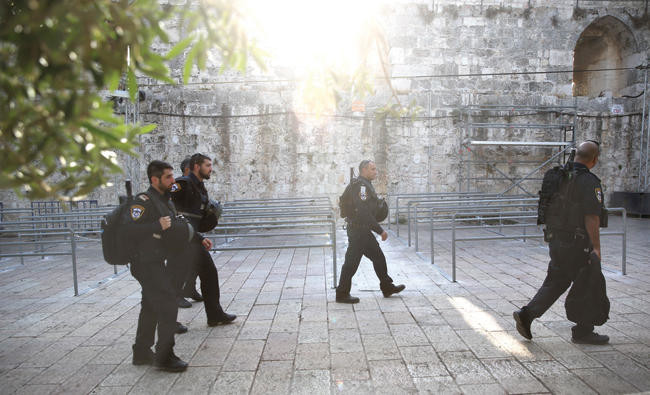
Lebanon moves toward accepting ICC jurisdiction for war crimes on its soil
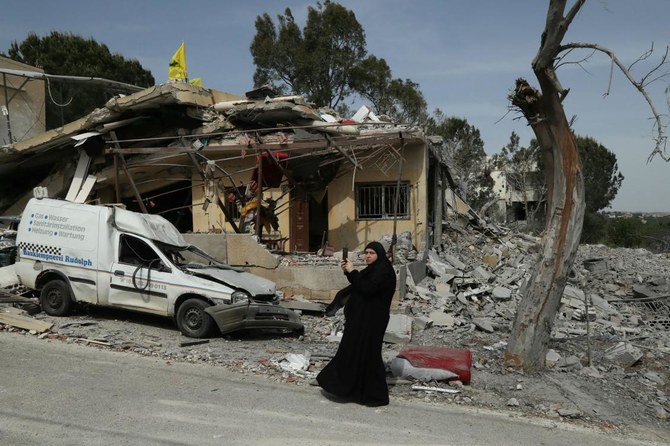
Filing a declaration to the court would grant it jurisdiction to investigate and prosecute relevant crimes in a particular period
BEIRUT: Lebanon has moved toward accepting the International Criminal Court’s jurisdiction to prosecute violations on Lebanese territory since October, in what Human Rights Watch said on Saturday was a “landmark step” toward justice for war crimes.
Lebanon has accused Israel of repeatedly violating its sovereignty and committing breaches of international law over the last six months, during which the Israeli military and Lebanese armed group Hezbollah have traded fire across Lebanon’s southern border in parallel with the Gaza War.
That cross-border shelling has killed at least 70 civilians, including children, rescue workers and journalists, among them Reuters visuals reporter Issam Abdallah, who was killed by an Israeli tank on Oct. 13, a Reuters investigation found.
Lebanon’s caretaker cabinet voted on Friday to instruct the foreign affairs ministry to file a declaration with the ICC accepting the court’s jurisdiction to investigate and prosecute crimes committed on Lebanese territory since Oct. 7.
The decree also instructed the foreign ministry to include in its complaints about Israel to the United Nations a report prepared by the Netherlands Organization for Applied Scientific Research (TNO), an independent research institute.
That report looked specifically into Abdallah’s killing, and was produced by examining shrapnel, flak jackets, a camera, tripod and a large piece of metal that were gathered by Reuters from the scene, as well as video and audio material.
Neither Lebanon nor Israel are members of the ICC, which is based in The Hague. But filing a declaration to the court would grant it jurisdiction to investigate and prosecute relevant crimes in a particular period.
Ukraine has twice filed such declarations, which allowed for the court to investigate alleged Russian war crimes.
“The Lebanese government has taken a landmark step toward securing justice for war crimes in the country,” said Lama Fakih, Middle East and North Africa director at Human Rights Watch, urging the foreign minister to “swiftly” formalize the move by filing a declaration to the ICC.
“This is an important reminder to those who flout their obligations under the laws of war that they may find themselves in the dock,” Fakih said.
British troops may be tasked with delivering Gaza aid, BBC report says
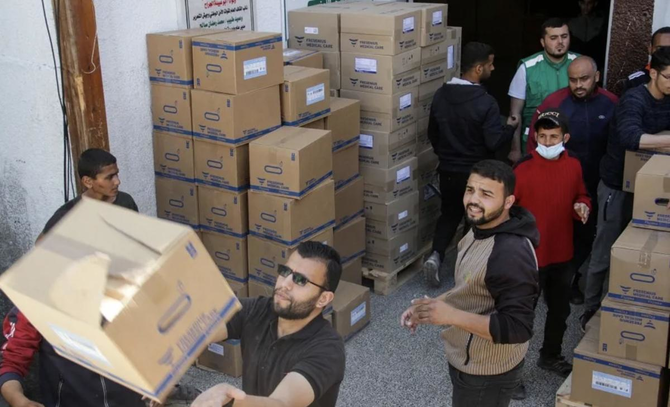
- Britain is already providing logistical support for construction of US pier, including a Royal Navy ship that will house hundreds of American soldiers
LONDON: British troops may be tasked with delivering aid to Gaza from an offshore pier now under construction by the US military, the BBC reported Saturday. UK government officials declined to comment on the report.
According to the BBC, the British government is considering deploying troops to drive the trucks that will carry aid from the pier along a floating causeway to the shore. No decision has been made and the proposal hasn’t yet reached Prime Minister Rishi Sunak, the BBC reported, citing unidentified government sources.
The report comes after a senior US military official said on Thursday that there would be no American “boots on the ground” and another nation would provide the personnel to drive the delivery trucks to the shore. The official, who spoke to reporters on condition of anonymity to discuss details not yet made public, declined to identify the third party.
Britain is already providing logistical support for construction of the pier, including a Royal Navy ship that will house hundreds of US soldiers and sailors working on the project.
In addition, British military planners have been embedded at US Central Command in Florida and in Cyprus, where aid will be screened before shipment to Gaza, for several weeks, the UK Ministry of Defense said on Friday.
The UK Hydrographic Office has also shared analysis of the Gaza shoreline with the US to aid in construction of the pier.
“It is critical we establish more routes for vital humanitarian aid to reach the people of Gaza, and the UK continues to take a leading role in the delivery of support in coordination with the US and our international allies and partners,” Defense Secretary Grant Shapps said in a statement.
Development of the port and pier in Gaza comes as Israel faces widespread international criticism over the slow trickle of aid into the Palestinian territory, where the United Nations says at least a quarter of the population sits on the brink of starvation.
The Israel-Hamas began with a Hamas-led attack into southern Israel on Oct. 7, in which militants killed around 1,200 people, mostly civilians, and took some 250 people as hostages. Israel says the militants are still holding around 100 hostages and the remains of more than 30 others. Since then, more than 34,000 Palestinians have been killed in Israel’s air and ground offensive, according to the Health Ministry in Hamas-run Gaza, around two-thirds of them children and women.
Israeli soldiers kill two Palestinian gunmen in West Bank, military says
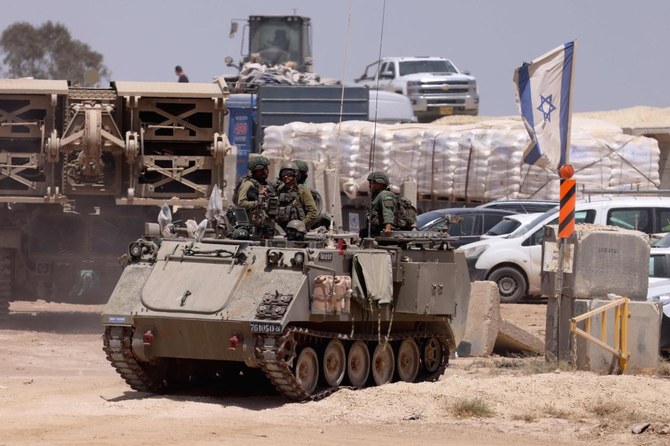
- Violence has been on the rise as Israel presses its attacks and bombardment in Gaza
RAMALLAH, West Bank: Israeli soldiers killed two Palestinian gunmen who opened fire at them from a vehicle in the occupied West Bank, the military said on Saturday.
The military released a photo of two automatic rifles that it said were used by several gunmen to shoot at the soldiers, at an outpost near the flashpoint Palestinian city of Jenin.
The official Palestinian news agency Wafa said security officials confirmed two deaths and the health ministry said two other men were wounded.
There was no other immediate comment from Palestinian officials in the West Bank, where violence has been on the rise as Israel presses its war against Palestinian militant group Hamas in Gaza.
Israel launched its offensive in Gaza after Hamas led an attack on southern Israel on Oct. 7 in which 1,200 people were killed and 253 taken hostage. More than 34,000 Palestinians have since been killed and most of the population displaced.
Violence in the West Bank, which had already been on the rise before the war, has since flared with stepped up Israeli raids and Palestinian street attacks.
The West Bank and Gaza, territories Israel captured in the 1967 war, are among the territories which the Palestinians seek for a state. US-brokered peace talks collapsed a decade ago.
Hamas says it received Israel’s response to its ceasefire proposal
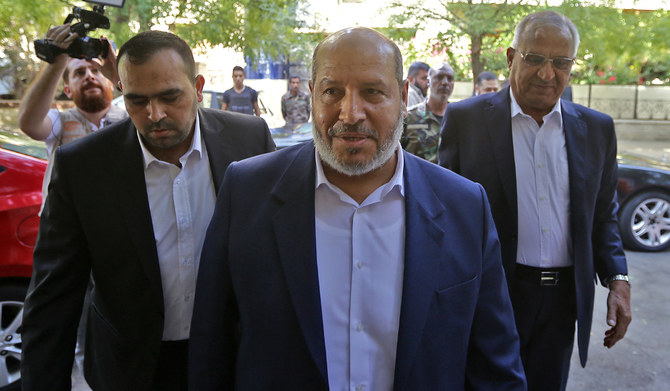
- White House national security adviser Jake Sullivan said on Friday he saw fresh momentum in talks to end the war and return the remaining hostages
- Israel has killed more than 34,000 Palestinians in Gaza, mostly women and children, according to the health ministry in the Hamas-run territory
CAIRO: Hamas said it had received on Saturday Israel’s official response to its latest ceasefire proposal and will study it before submitting its reply, the group’s deputy Gaza chief said in a statement.
“Hamas has received today the official response of the Zionist occupation to the proposal presented to the Egyptian and the Qatari mediators on April 13,” Khalil Al-Hayya, who is currently based in Qatar, said in a statement published by the group.
After more than six months of war with Israel in Gaza, the negotiations remain deadlocked, with Hamas sticking to its demands that any agreement must end the war.
An Egyptian delegation visited Israel for discussion with Israeli officials on Friday, looking for a way to restart talks to end the conflict and return remaining hostages taken when Hamas fighters stormed into Israeli towns on Oct. 7, an official briefed on the meetings said.
The official, who spoke on condition of anonymity, said Israel had no new proposals to make, although it was willing to consider a limited truce in which 33 hostages would be released by Hamas, instead of the 40 previously under discussion.
On Thursday, the United States and 17 other countries appealed to Hamas to release all of its hostages as a pathway to end the crisis.
Hamas has vowed not to relent to international pressure but in a statement it issued on Friday it said it was “open to any ideas or proposals that take into account the needs and rights of our people.”
However, it stuck to its key demands that Israel has rejected, and criticized the joint statement issued by the USand others for not calling for a permanent ceasefire and the withdrawal of Israeli forces from Gaza.
White House national security adviser Jake Sullivan said on Friday he saw fresh momentum in talks to end the war and return the remaining hostages.
Citing two Israeli officials, Axios reported that Israel told the Egyptian mediators on Friday that it was ready to give hostage negotiations “one last chance” to reach a deal with Hamas before moving forward with an invasion of Rafah, the last refuge for around a million Palestinians who fled Israeli forces further north in Gaza earlier in the war.
Meanwhile, in Rafah, Palestinian health officials said an Israeli air strike on a house killed at least five people and wounded others.
Hamas fighters stormed into Israeli towns on Oct. 7, killing 1,200 people and capturing 253 hostages. Israel has sworn to annihilate Hamas in an onslaught that has killed more than 34,000 Palestinians.
Yemen’s Houthis say their missile hit Andromeda Star oil ship in Red Sea
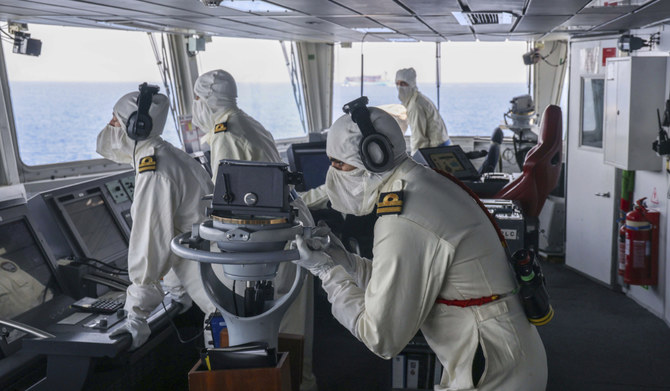
- US military confirmed that the Houthis launched three anti-ship ballistic missiles but caused minor damage to the ship
- A missile landed in the vicinity of a second vessel, the MV Maisha, but it was not damaged, US Centcom said on social media site X
CAIRO/LOS ANGELES: Yemen’s Houthis said on Saturday their missiles hit the Andromeda Star oil tanker in the Red Sea, as they continue attacking commercial ships in the area in a show of support for Palestinians fighting Israel in the Gaza war.
US Central Command confirmed that Iran-backed Houthis launched three anti-ship ballistic missiles into the Red Sea from Yemen causing minor damage to the Andromeda Star.
The ship’s master reported damage to the vessel, British maritime security firm Ambrey said.
A missile landed in the vicinity of a second vessel, the MV Maisha, but it was not damaged, US Central Command said on social media site X.
Houthi spokesman Yahya Sarea said the Panama-flagged Andromeda Star was British owned, but shipping data shows it was recently sold, according to LSEG data and Ambrey.
Its current owner is Seychelles-registered. The tanker is engaged in Russia-linked trade. It was en route from Primorsk, Russia, to Vadinar, India, Ambrey said.
Iran-aligned Houthi militants have launched repeated drone and missile strikes in the Red Sea, Bab Al-Mandab Strait and Gulf of Aden since November, forcing shippers to re-route cargo to longer and more expensive journeys around southern Africa and stoking fears the Israel-Hamas war could spread and destabilize the Middle East.
The attack on the Andromeda Star comes after a brief pause in the Houthis’ campaign that targets ships with ties to Israel, the United States and Britain.
The USS Dwight D. Eisenhower aircraft carrier sailed out of the Red Sea via the Suez Canal on Friday after assisting a US-led coalition to protect commercial shipping.
The Houthis on Friday said they downed an American MQ-9 drone in airspace of Yemen’s Saada province.


